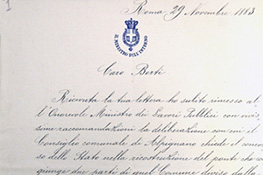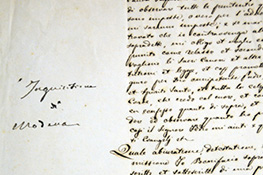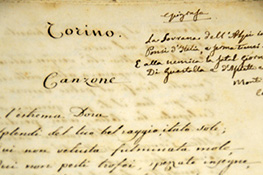Versione italiana English version Version française Versión en español
Domenico Berti (1820-1897), was an essayist, professor of Moral Philosophy at the University of Turin, then of History of Philosophy in Rome. As a politician he fought for the renewal of school programs and structures, as Minister of Public Education in the governments La Marmora II and Ricasoli II. He was also Minister of Agriculture, Industry and Commerce in the governments of De Pretis IV and V.
Berti was a great scholar of the Italian thought of the Renaissance, author of a Life of Giordano Bruno published in Turin by Paravia in 1858 and Around Giovanni Pico della Mirandola: unpublished notes and documents (Turin 1959). The first part of his archive contains the preparatory notes to his books and others that deal with the figures of Copernicus, Galilei, Campanella. The writings on the Medici family, Savonarola and Poliziano were later used for the volume The House of Medici and the Neapolitan school of Florence (1864).
From this complex of notes emerges clearly the within of his studies and interests, which fundamentally touch on the theme that he very much felt of freedom of conscience. Among the most significant subjects dealt with are averroism (in particular notes on the court of Frederick II and Manfred), theological discussions (ancient theogony, theological doctrines, theory of predestination), the theme of the plurality of the worlds.
Among the papers there are some interesting authentic documents, such as a fragment of abjuration at the Inquisition of Modena signed by Bonifacio Valentino on 6 March 1558.
In the second part of the archive are collected correspondence with various personalities of the time, including Desiderato Chiaves, Agostino De Pretis and Quintino Sella. Also present some prominent female figures, such as the writer and educator Giulia Molino Colombini, the poet Erminia Fuà Fusinato (poet Arnaldo's wife), a woman of great modernity of thought, and Dora Melegari, writer who edited among other things the edition of some letters by Mazzini, some of which addressed to his father, the patriot Luigi Amedeo Melegari.
- Archive inventory (pdf 346 KB)



